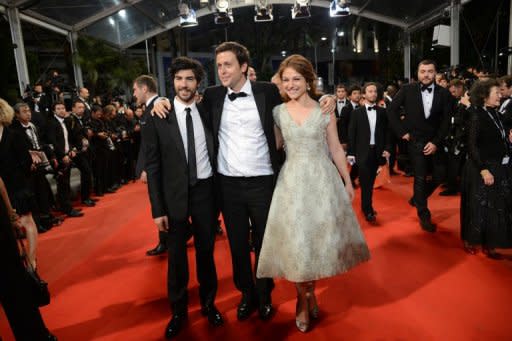Kilts-and-whisky comedy tells Cannes hard truth with a smile
Cannes veteran Ken Loach brought the rain-soaked Riviera a burst of sunshine Tuesday -- and jolted a few consciences along the way -- with a bittersweet comedy about whisky, kilts and the scourge of joblessness. The 75-year-old Loach, who took the Palme d'Or in 2006 for "The Wind That Shakes the Barley" about Ireland's independence struggle, is back with an 11th film in competition, a record for the Riviera festival. "The Angel's Share," set in Glasgow, tells the story of Robbie, a jobless youth from a broken home stuck in a rut of violent behaviour, who sets out to change his ways after his girlfriend gives birth to a baby boy. Sentenced to community service for a vicious assault, Robbie -- played by the street-cast Glaswegian Paul Brannigan -- is set to work under the benevolent eye of Big Harry, who introduces him and his motley crew of young offenders to the art of whisky-tasting. When Robbie discovers he has a nose for the peaty, smoky, spicy aromas of a fine malt, he lands on a way to break out of a dead-end life, and prove he can be a worthy father. Despite the backdrop of poverty, hopelessness and violence, Loach drew delighted laughs at a press preview of the film -- brightening a mood dragged down by days of unseasonable rain -- ahead of its evening red-carpet screening. "If you want to tell the truth about people, you've got to have a smile in there," the director told AFP in an interview. "These are very dark times, obviously for most people across Europe, for a lot of young people particularly, because of the mass unemployment and no prospect of living a secure life," he said. But in bringing the lives of poor, jobless Glasgow kids to the screen, Loach and his screenwriter Paul Laverty also "wanted to break the stereotype that poverty equals misery." "Spend some time with them and you spend your time laughing, because they are funny, and they are witty, and they are surprising. And what a waste for that generation." Through the whisky storyline -- which sees Robbie and his dropout chums don highlander kilts to blend in at a prized whisky auction -- Loach skewers the social inequalities in modern-day Britain. "There is a lot of pretension about whisky, like there is about wine," he said. "People will pay huge amounts for a rare whisky, which shows there is colossal wealth set against grinding poverty. More broadly, Loach has fun pitting tourist cliches about Scotland -- the whisky, shortbread and kilts -- against "the reality, which is pretty harsh." While researching the film, screenwriter Laverty met Brannigan, its young star, at a community centre in Glasgow and approached him for the part. The 25-year-old told a Cannes press conference the film had saved his life. "Things were tough, I had no money," he said. "It was Christmastime, and I got a loan which I wanted to pay back, and I thought well, if I make a couple of hundred quid, that will see me through." "Hands-up I would say they probably saved my life. Because who knows what I'd have done for money, who knows what I would have done." Brannigan said he was "very familiar" with the themes of the movie. "My background was quite rough," he told reporters. "In all honesty there are thousands like me in Glasgow with the same story, the same situation: unemployed, people with no education who can't get employment." But Loach told AFP that Brannigan was cast for his on-screen charisma just as much as his background. "The fact that Paul has had some tough experiences in his life is obviously going to help him," Loach said. "But the main thing is when you see him on screen you've got to believe him." "The Angel's Share is one of 22 films in competition for the Palme d'Or top prize, which will be awarded on Sunday. First in Cannes in 1970 with "Kes", about a working-class boy who finds an escape from a bleak life in caring for a kestrel, Loach said it was "rather embarrassing" to have been in competition so many times. Yet even today, he said a Cannes selection was "massively important. "Every film, you take a huge risk, and for it to be selected for Cannes validates it, it says it's not a total disaster. "People in film come here to find partners, and parade and show off, and it's a pain in the neck sometimes -- but it's a great celebration of film and diversity. "If it didn't exist we would want to invent it!"




